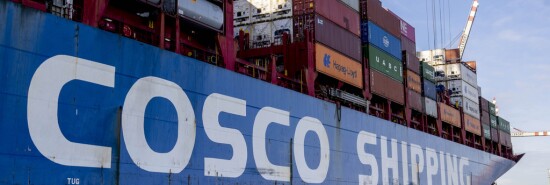
US shouldn’t protect Chinese shipping in the Red Sea
Tom Rogan
Video Embed
The United States has established a maritime security initiative to confront Houthi rebel attacks on international shipping in the Red Sea. Two actions should now follow.
First, President Joe Biden should order air and missile strikes against Houthi forces in Yemen. He should request that the United Kingdom, France, and Spain (also members of the initiative) participate in those strikes to lend them multinational credibility. Limited military action is the only way to degrade Houthi capabilities and impose a new strategic calculus on its leaders. That action is also important toward underlining deterrence against Iran amid the Israel-Hamas war. Iran provides outsize support to the Houthis and holds influence over their leadership.
DECLINING SITUATION AT SOUTHERN BORDER UPS ANTE ON SENATE IMMIGRATION TALKS
Second, Biden should make clear that the U.S. will not protect ships in the Red Sea that are transporting goods to or from China. This might sound extreme but consider some additional context.
For a start, observe that Beijing has refused to join the maritime security initiative, even though it has the naval forces and economic interest to do so. Chinese goods exports to Europe amounted to nearly $700 billion in 2022. Thanks to the Houthis, however, many of those exports are now having to divert around Africa to get to Europe. This doesn’t exactly support Beijing’s sputtering economy.
The diverted route adds 10 days to the journey. And as the South China Morning Post notes: “The spot rate for sending a 40-foot container from China to the Mediterranean increased by over 70% in the past month to US$2,414 as of Friday, according to the Freightos Baltic Index. The rate for routes from China to Northern Europe also increased by 55% compared to a month earlier to US$1,467, the index showed.”
Some vessels are continuing to transport goods to and from China via the Red Sea route. While the Houthis are unlikely to target Chinese vessels deliberately in fear of aggravating Iran (which prioritizes its relationship with Beijing), their ship identification and targeting capabilities are imprecise.
CLICK HERE TO READ MORE FROM THE WASHINGTON EXAMINER
Nevertheless, the basic point here is that the U.S. has no obligation to provide free security for China — especially at present. After all, just as the Houthis are now attacking international shipping in the Red Sea, Chinese maritime militia and coast guard vessels are simultaneously ramming Philippine vessels. Beijing is taking this action within the Philippines’s exclusive economic zone because it makes grand imperialist claims over the near entirety of the South China Sea.
The Philippines is a treaty defense ally of the U.S. Beijing is ultimately engaged in exactly the same action as the Houthis: attacking the rights of free navigation in international waters. In turn, it should be an absurd proposition for the U.S. to defend Chinese shipping interests. If other members of the maritime initiative wish to do so, that is their prerogative.
